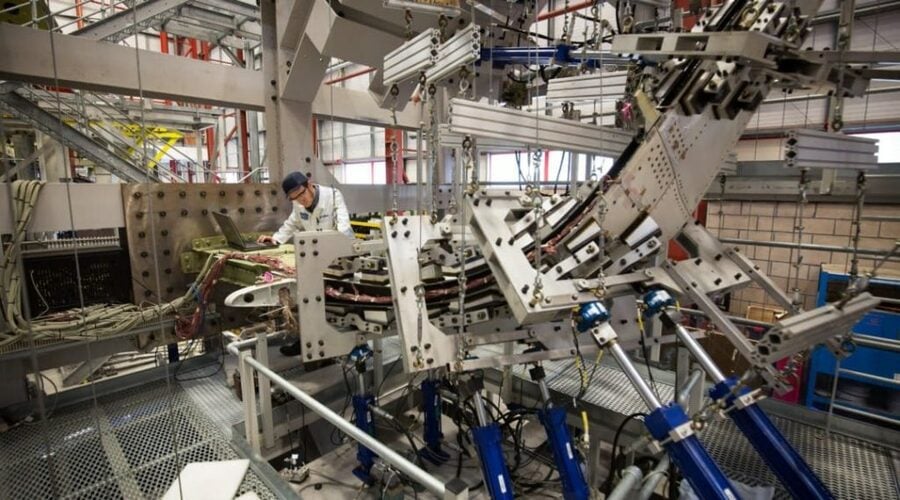A typical airframe fatigue test is divided in a number of fatigue load blocks. At the end of each flight block the test is stopped and the specimen is inspected for cracks. These manual inspections are time consuming and the time interval between these inspections is relatively large. Structural abnormalities may be detected too late, which could lead to retrofitting in-service aircraft in a worst-case scenario. Condition Based Inspections (CBI) of the specimen, instead of Risk Based Inspections (RBI), is a potential solution to reduce the total fatigue test duration and to quickly detect abnormalities. One of the implications is that more sensors are required to monitor the behaviour of the test specimen and to detect or predict structural failures.
“A full-scale airframe fatigue test can generate data at rates of up to 10 MB/s,
totalling to hundreds of terabytes at completion.
Data processing and analysis is a major bottleneck.”
Gantner Instruments has developed an innovative software platform, called GI.cloud, aimed at efficient processing of large volumes of measurement data and rapid analysis. GI.cloud combines a time series database management system with a powerful stream processing engine, offering a number of distinct advantages.
- Minimise your investment cost for IT and storage infrastructure in the test lab, whilst maintaining the necessary computing performance for test-critical data analysis tasks. Measurement data that you need to accessed right away (hot data) is available in the database. Data that you access less frequently, and is only needed for auditing or bookkeeping purposes (cold data), is kept in the stream processing platforms.
- Raw measurement data is safely stored in redundant, fault-tolerant clusters for automated backup. Flexible data aggregation ensures that your measurement data is continuous logged to the database at low sample rate. The database can replay the same data and store it at a higher sample rate in case detailed analysis around an unexpected event or specimen failure is required.
- Powerful querying capabilities enable you to analyse large amount of measurement data on-the-fly. Trend monitoring over the entire life of the fatigue test will quickly identify any significant change in strain between repetitive load conditions. Fatigue prediction and crack probability algorithms can identify possible loss of structural integrity during the test and immediately inform you when deviations occur.
Contact your local sales representative to learn more about GI.cloud.

More articles
Measurement Explorer – Simplify Your Data Management with GI.bench
Engineers managing complex test setups know the frustration of hunting through countless data files, sensor channels, and historical records. The new Measurement Explorer in GI.bench addresses this challenge head-on, streamlining data management into a unified, intuitive, and fast user interface.
Read more...Gantner Instruments presents new Machine Learning and Fault detection routines at leading PV and Energy conference in Brussels, Belgium
Within the EU founded project “IPERMON” (“Innovative Performance Monitoring System for Improved Reliability and Optimized Levelized Cost of Electricity”) Gantner Instruments was developing different fault detection routines and failure classification methods for time series data sets.
Read more...Gantner delivers DAQ for Open Rotor Engine
Gantner Instruments has delivered its Q.series data acquisition system for a major research programme exploring Geared Pusher Open Rotor engine designs, with the goal of achieving a 20% reduction in fuel consumption and CO2 emissions.
Read more...Monitoring Porto’s New 400-Meter Metro Bridge
Porto is expanding its metro network, and a key challenge was building a new Douro River crossing that enhances mobility without disrupting the city’s iconic bridge landscape. The result is Ponte Ferreirinha, a slender concrete frame bridge carrying metro trains, cyclists, and pedestrians, blending seamlessly into a dense urban environment.
Read more...